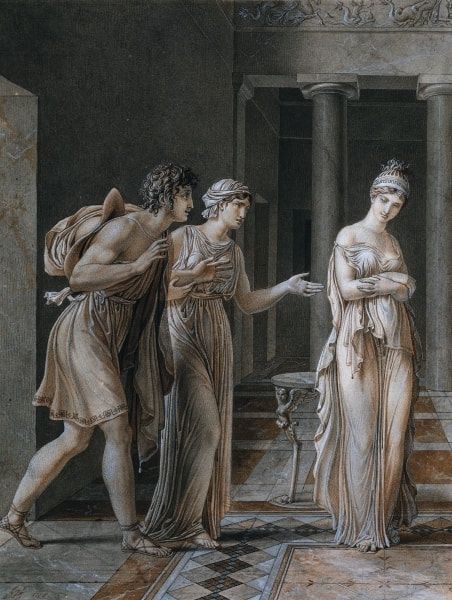HERMIONE IN GREEK MYTHOLOGY
Hermione was the daughter of Menelaus and Helen in Greek mythology. Hermione would end up being the centre of disagreement between Orestes and Neoptolemus when she was promised in marriage to both.
Hermione Daughter of Menelaus
Hermione was the only child of Menelaus, King of Sparta, and Helen, his wife.
Paris would of course come to Sparta and take Helen, along with Spartan treasure back to Troy. Hermione was but nine years old at the time, but her mother left without her.
The “abduction” of Helen would bring about the Trojan War, and Hermione’s father, Menelaus, left for ten years, and it was said that Hermione spent the war years in the palace of Agamemnon, her uncle, where she was looked after by Clytemnestra.
Paris would of course come to Sparta and take Helen, along with Spartan treasure back to Troy. Hermione was but nine years old at the time, but her mother left without her.
The “abduction” of Helen would bring about the Trojan War, and Hermione’s father, Menelaus, left for ten years, and it was said that Hermione spent the war years in the palace of Agamemnon, her uncle, where she was looked after by Clytemnestra.
Hermione Betrothed
|
As was custom, Hermione would be promised in marriage to a suitable husband, although there is some disagreement about who did the promising.
Some say that Menelaus first promised Hermione to Orestes, Hermione’s cousin, but then during the war, Achilles’s son, Neoptolemus, joined the Achaean forces and became one of the most noted fighters. Then Menelaus, promised Hermione to the son of Achilles. Others though, state that Menelaus knew nothing about Hermione being promised to Orestes, for this arranged marriage was made by Tyndareus, the former King of Sparta, and nominally Hermione’s grandfather (although Helen was the daughter of Tyndareus’ wife Leda, rather than Tyndareus). |
Hermione and Her Parents
Hermione would be reunited with her parents in Mycenae, for Menelaus and Helen arrived after Orestes had exacted revenge for the death of his father. Thus, Orestes and Hermione had already met.
Hermione was in danger though, for a plan was concocted by Orestes, Pylades and Electra to use Hermione as a bargaining chip to use with Menelaus, although this plan was never put into fruition.
Hermione was in danger though, for a plan was concocted by Orestes, Pylades and Electra to use Hermione as a bargaining chip to use with Menelaus, although this plan was never put into fruition.
Hermione in Epirus
|
As Orestes was being chased by the Erinyes, Menelaus dispatched Hermione to Epirus, where Neoptolemus was now king, and so Hermione was now wed.
Hermione though could not conceive a child with Neoptolemus, whilst Neoptolemus’ concubine, Andromache conceived several. Hermione would blame Andromache for the situation, and called upon Menelaus to avenge her. Menelaus arrived in Epirus whilst Neoptolemus was away at Delphi, but |
|
Andromache herself was saved, when Peleus, Neoptolemus’ grandfather came to protect her.
Hermione and Orestes
Hermione though, would soon find herself a widow.
Commonly it was said, that Neoptolemus was killed at Delphi, when Apollo struck him down; Neoptolemus having blamed the god for his father’s death.
Alternatively, Neoptolemus died at Delphi when Orestes arrived with a fighting force; Orestes already having been to Epirus to retrieve Hermione, who had previously been promised to him.
Orestes and Hermione were thus wed, and Hermione became Queen of Mycenae.
Hermione then gave birth to a son, Tisamenus. Nothing thereafter is said of Hermione.
Commonly it was said, that Neoptolemus was killed at Delphi, when Apollo struck him down; Neoptolemus having blamed the god for his father’s death.
Alternatively, Neoptolemus died at Delphi when Orestes arrived with a fighting force; Orestes already having been to Epirus to retrieve Hermione, who had previously been promised to him.
Orestes and Hermione were thus wed, and Hermione became Queen of Mycenae.
Hermione then gave birth to a son, Tisamenus. Nothing thereafter is said of Hermione.
|
|
Colin Quartermain - Hermione - 24th January 2021
